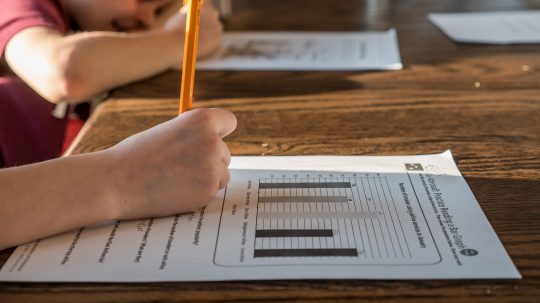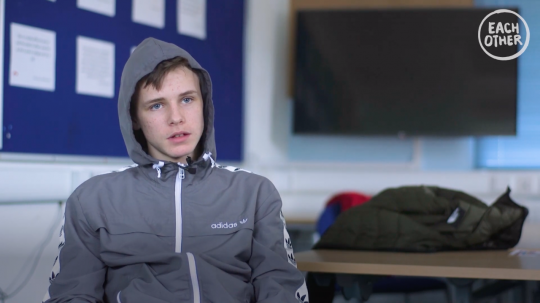I’m a youth worker in north London. I’ve worked with a large number of young people who’ve been excluded from school, and my youth centre has worked with hundreds. The story below is a composite case study, combining multiple young people’s experiences of education and exclusion. I’ve used this method in order to protect their privacy and to convey the wide range of issues that can contribute to exclusions, including various factors that can lead to breakdowns in relationships between families and schools. It doesn’t use any real names.
Tyrone lives with his mum, Helen, and his younger sister, in a small flat. His dad used to live there too, but he wasn’t a very nice man, and Tyrone was glad when he went. Helen works multiple jobs, and always seems stressed.
Tyrone goes to a local primary school. It’s small, nurturing and supportive. His class teacher, head teacher and family support worker know him and his mum really well. They’re always incredibly kind to them both. He has some difficulties with anger and fighting in the playground, but they’re discussed and dealt with. He’s got a group of really close friends, and his best friend is Hannah.
In Year 6, Tyrone goes for an induction day at the local secondary he will be attending. All the students are told to line up in absolute silence and to walk through corridors single file, facing the front. Tyrone thought it wasn’t serious. He thought the school was playing a joke on the students about what secondary could be like – but when he turned round to Hannah and laughed, he was told he’d have a detention on his first full day in school in September.
On his first day in September, Tyrone wore the wrong socks. His mum hadn’t realised he could only wear the school’s branded socks. He was sent home before even starting his first lesson. The school didn’t check he had keys, or that anyone would be home. A passer-by found him crying in the street, managed to contact his mum, and took him home.
Helen was livid at the school. One of her jobs is in a nursery, so she knows a bit about safeguarding. She speaks to the school’s Designated Safeguarding Lead on the phone, and raises her concerns. The safeguarding lead is a teacher with a 50% teaching timetable, who only has half the week to look after the safety of the school’s 1,500 pupils. He seems distracted, almost absent-minded on the phone, and apologises for what’s happened.

One child got sent home from school for wearing the wrong socks. Credit: Unsplash
There are 180 pupils in a year in Tyrone’s new school. He’s struggling to make new friends and unable to familiarise himself with how his timetable works. His sister has been ill and his mum is stressed about it, so he hasn’t been able to talk to her about school much. He’s been told he can speak to his head of year about any concerns, but he only really sees the head of year when they’re barking at students to stay in silence during their thrice-daily “line-ups”. So he doesn’t really want to talk to them.
In Year 8, there are more incidents. Tyrone gets a fixed-term exclusion for an altercation in the playground, “for the safety of the Academy community”. He’s also kept indoors during break and lunchtime for a month, just given a sandwich rather than hot food. Helen is angry about this, but doesn’t have the time to challenge it, despite Tyrone’s daily outbursts at home about what he’s going through and how unfair it is.
Tyrone starts having real problems in English. His sister is a bit better now, so Mum has some more time, and arranges a meeting at the school. She talks to Tyrone’s English teacher, Ms Jones, who is also the Special Educational Needs Coordinator (SENCo). Ms Jones has a 70% teaching timetable – she has about a third of a week to look after all the additional needs of all the students in the school.
Tyrone had said he was one of the only staff members that the students liked and felt they had a relationship with.
Luke Billingham
Helen asks Ms Jones if they’ve ever considered that Tyrone might have additional needs. Could they not at least assess his needs? Ms Jones gives vague, evasive answers, and seems patronising. Helen loses patience. Ms Jones says she’s being “very emotive”. Helen points out that Tyrone had a good relationship with a learning mentor that used to help him and other students.
Tyrone had said he was one of the only staff members that the students liked and felt they had a relationship with. Ms Jones said that unfortunately, due to budget cuts, they’d had to cut down their numbers of support staff. Helen asked how the school was able to afford a new Personal Assistant for the headteacher that year. She was then asked to leave – Ms Jones said she was being rude. On her way out, Helen swore in frustration.
Earlier that morning, a parent called Jane had gone in to school for a meeting. Jane is roughly the same age as Helen, and lives round the corner from her. Jane came in to discuss her child’s performance in English.
She suggested some different strategies the teacher could use for working with her son – ones that had worked well when his private tutor tried them on the weekend. She was thanked for being “such an engaged parent”. Turns out she went to the same university as Ms Jones.
The next day, Helen received a letter telling her she’s banned from the school premises for three months, for being “aggressive and confrontational”. If she goes onto school property, she could face a £750 fine.
Tyrone’s issues in class continue. He receives a couple more fixed-term exclusions through the course of Year 8 and 9, but things seem to be stabilising somewhat – he’s not a perfect student, but there are no discussions about escalating towards any more severe punishment.
In Year 10, this changes. The school seems even stricter and more disproportionate in punishing his every minor infraction. Tyrone increasingly complains to his mum about the school. Helen tries to encourage him that he’s at a really important point in his school life and needs to just knuckle down. Exams are soon.

Students need to knuckle down and focus on exams. Credit: Unsplash
If he plays up and gets in trouble, he’s kind of letting the school win – if he is right that they’re deliberately provoking his misbehaviour. But Helen struggles to disagree with Tyrone when he says the school is being unfair. She’s raging with the school, but she tries to hide it from Tyrone as best she can.
Helen’s mum passes away, and Tyrone is incredibly upset about it. His behaviour gets worse the week after, and he gets another fixed-term exclusion. Helen writes an email to the school explaining the situation, but just gets a generic response. “We’re very sorry for your loss,” it begins, “but the Academy prides itself on upholding the highest expectations of pupil conduct at all times.”
In Spanish, Tyrone has a teacher who struggles to control the class. In a lesson mid-way through Tyrone’s time in Year 10, the teacher almost trips over a student’s leg. Angrily, she swiftly and abruptly nudges the student’s leg back under the table. All the students erupt. “You kicked him!”
The students who were sat closest to the incident are asked to write statements. Tyrone writes that the teacher “quickly moved his leg with her foot, like in a stabbing motion”. A couple of other students write that it was a kick. The deputy head calls the three students who wrote witness statements in to a meeting, and asks if they want to change their statements. He says they’re making very serious allegations, and that if they make false allegations they’ll be punished heavily. The two other students change their statements, but Tyrone refuses.
The next day, Helen receives a letter informing her that Tyrone has been permanently excluded. The letter says that Tyrone writing a false allegation in a witness statement was the last straw. He’s being excluded for persistent disruptive behaviour.
Helen appeals the decision. She’s told there’ll be a Governing Body Student Disciplinary Committee meeting to hear her and Tyrone’s case. It all sounds a bit legalistic and intimidating, but she doesn’t think to get legal advice, she doesn’t think she can.
Helen is asked if she wants to submit any written evidence, to go into the evidence pack the Governors will get ahead of the meeting. She sends in some emails she’d received from staff about how well Tyrone was doing in some subjects, and an email exchange she had with the SENCo pleading with them to assess Tyrone for additional needs.

All the negative points stood out, highlighted in yellow. Credit: Unsplash
A few days before the meeting, Helen receives the evidence pack that has been sent to her, the governors, and the headteacher. It’s 150 pages long. Most of the pages are print-outs from the school’s data management system, showing Tyrone’s “behaviour points” from Year 7 right up to the present.
There are both negative and positive points in the data table, but all the negatives have been highlighted in yellow. The table includes a few words to describe the reason for each behaviour point. “Disruptive behaviour”, “disruptive behaviour by default”, “contraband in school”, and so on.
Helen and Tyrone sit down and go through some of the behaviour points to try to remember what actually happened, ready to explain, but it’s really hard for Tyrone to remember, and they end up getting stressed out and frustrated with one another. Tyrone storms out the room. Later, he comes back, and hugs his mum.
A large classroom is set out like a courtroom for the Governing Body Student Disciplinary Committee meeting. All the governors are white, as are the headteacher and deputy head. Tyrone and Helen are bamboozled by what’s happening within a few minutes of the meeting starting.
The phrase “balance of probabilities” keeps being used, but no-one has explained what it means. The headteacher confidently launches into a speech about why Tyrone’s behaviour can no longer be managed within “a mainstream setting such as the Academy”.
He seems to exaggerate how much support and nurture Tyrone received in the school, but without outright lying. It seems as though he may have delivered very similar speeches to this many times before – the words glide out smoothly.
Suddenly, Helen is asked to speak. She didn’t know she would be expected to make some kind of speech. She talks about the meetings she had in school to try to get Tyrone’s additional needs assessed. She talks about the learning mentor Tyrone misses.
She talks about her mum passing away and how it affected Tyrone, and gets a bit upset. (Tyrone rubs her shoulder but everyone else just look at her blankly.) She says that Tyrone didn’t exactly write that the teacher kicked the student, and how can they prove it was a false allegation anyway?

Grieving children face additional challenges in school. Credit: Unsplash
In the headteacher’s response, he uses the phrase “balance of probabilities” again. In the corner is sat someone from the council’s exclusions team. At the start of the meeting they had read out some guidance for the meeting, but they’ve just sat there silently ever since.
The governors ask a few questions. They ask the headteacher why Tyrone’s needs weren’t assessed. The headteacher talks about Special Educational Needs funding cuts. And he says Tyrone’s primary school should have got assessments done before Tyrone joined. A governor asks Tyrone if he accepts that he made some bad choices. Tyrone says: “yeah, I guess”.
When the meeting ends, the Chair of the meeting says “good luck” to Tyrone. It sounds ominous. After the meeting, the governors go for a meal with the headteacher – they were overdue a catch-up.
Helen is told in a letter a few days later that the the governors upheld the exclusion decision. She is told she can take it to the Independent Review Panel (IRP) if she wants to continue contesting the decision. Tyrone says she shouldn’t bother, he’s resigned to his exclusion now, but Helen says it’s not fair and she has to fight it. Again, no-one tells her she can get legal advice.
At the IRP, the people overseeing the meeting are friendlier, warmer. They’re all in their 60s. They introduce themselves as former local headteachers. They question the Chair of Governors about how much training they’ve had to chair Governing Body Student Disciplinary Committee meetings, and ask how much training all of the governors have had in safeguarding and Special Educational Needs. When the Chair give their answer, it doesn’t sound like very much to Helen.
At one point in the middle of the meeting, the Chair of Governors condescendingly turns to Helen and says: “I realise how difficult this kind of meeting can be for you, Mum.”
The IRP instruct the governors to re-consider the exclusion. The letter Helen receives says the IRP concluded that the school didn’t produce sufficient evidence that Tyrone’s behaviour was so persistently and severely disruptive as to warrant an exclusion. Mum is confused when she reads this – if the IRP think the school made the wrong decision, does this mean Tyrone isn’t excluded anymore?
The governors swiftly decide to uphold their previous decision, and Tyrone is excluded.
Towards the end of Year 10, he’s moved to the one Pupil Referral Unit that serves the whole borough. It doesn’t offer the GCSEs he most enjoyed in mainstream school – the ones that were going to be most important for the BTEC course he wanted to do, and for the career he wanted to get in to.
Tyrone’s path to exclusion was not inevitable. There are many clear moments where, had a different approach been taken, he could have remained in mainstream education – on track for the future he had hoped for.
We know what could be done to reduce school exclusions – and I will examine this further in part two of my contribution to EachOther’s Excluded series, set to be published next week.
For starters, the RSA, the Centre for Social Justice, The Children’s Commissioner, JUSTICE, and the Timpson Review have all presented detailed reports with clear, evidence-based recommendations.
We must reflect on why we have been so slow to adopt them.
_____________________
Excluded: EachOther’s forthcoming documentary
On 10 December 2020, Human Rights Day, EachOther will release ‘Excluded’, a documentary with a difference focussing exclusively on young people’s perspectives on school exclusions.
Young people have the right to education (The Human Rights Act, Article 2, Protocol 1). They also have a right to express themselves on issues that concern them, be listened to and taken seriously (UN Convention on the Rights of the Child, Article 12).






